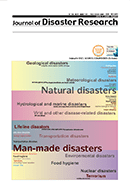
Journal of Disaster Research
Scope & Guideline
Exploring the nexus of engineering and safety for effective disaster response.
Introduction
Aims and Scopes
- Disaster Risk Reduction and Resilience Building:
The journal emphasizes strategies and methodologies aimed at minimizing disaster risks and enhancing community resilience through innovative approaches. - Impact of Climate Change on Disasters:
Research exploring the interplay between climate change and disaster frequency/intensity, including adaptation strategies for vulnerable regions. - Psychosocial Support and Community Recovery:
Studies addressing the mental health impacts of disasters and the importance of community support systems in recovery processes. - Technological Innovations in Disaster Management:
Focus on the use of emerging technologies, such as AI and simulations, in improving disaster preparedness and response. - Historical Analysis of Disasters:
Research that provides insights from historical disasters to inform current disaster management practices and policies. - Education and Awareness in Disaster Preparedness:
Development of educational programs and materials aimed at increasing public awareness and preparedness for disasters. - Public Health and Disaster Response:
Investigating the intersection of public health initiatives and disaster response, particularly in the context of pandemics and health emergencies.
Trending and Emerging
- Integration of Technology in Disaster Management:
A growing trend in the use of digital tools and data analytics for improving disaster response and recovery, including AI, simulations, and real-time monitoring. - Cross-Disciplinary Approaches:
Research that draws from various disciplines, including sociology, psychology, engineering, and environmental science, to foster a comprehensive understanding of disaster resilience. - Focus on Community Engagement and Local Knowledge:
Increasing emphasis on incorporating local knowledge and community participation in disaster preparedness and response strategies. - Mental Health and Psychosocial Support in Disasters:
Heightened focus on the mental health impacts of disasters and the importance of psychosocial support systems in recovery efforts. - Climate Change Adaptation Strategies:
Research addressing how communities can adapt to the increasing frequency and severity of climate-related disasters, emphasizing sustainability. - Public Health Preparedness in Disaster Contexts:
Emerging interest in the intersection of public health and disaster management, particularly in light of the COVID-19 pandemic and other health crises.
Declining or Waning
- Conventional Disaster Response Models:
Traditional models of disaster response that do not incorporate modern technological advancements or community-based approaches are becoming less prevalent. - Focus on Single Hazard Events:
There is a noticeable decline in research centered on single hazard events, as the journal increasingly addresses compound and interconnected risks. - Static Risk Assessment Methods:
Static methods of risk assessment are being overshadowed by dynamic and adaptive approaches that consider changing conditions and uncertainties. - Overemphasis on Infrastructure Solutions:
Research that primarily focuses on physical infrastructure improvements is waning in favor of more holistic, community-centric disaster resilience strategies. - Historical Case Studies without Current Application:
Historical analyses that do not connect lessons learned to contemporary disaster management practices are less frequently featured.
Similar Journals
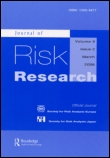
JOURNAL OF RISK RESEARCH
Advancing Knowledge in Risk Analysis and ManagementJOURNAL OF RISK RESEARCH, published by Routledge Journals, Taylor & Francis Ltd, is a prestigious academic journal dedicated to advancing the understanding of risk across diverse fields, including engineering, safety, social sciences, and management. With its impact reflected in its Q1 quartile rankings in multiple categories and a solid standing in Scopus rankings, this journal serves as an essential resource for researchers, professionals, and students aiming to explore the complexities of risk analysis and its implications in real-world scenarios. The journal has been consistently publishing high-quality research since 1998, contributing to both theoretical frameworks and practical applications. While not open access, the content of the journal is invaluable for those keen on staying at the forefront of risk research. By addressing the multifaceted nature of risk, including safety, reliability, and strategic management, the JOURNAL OF RISK RESEARCH plays a vital role in shaping contemporary discussions and innovations in risk management and decision-making.
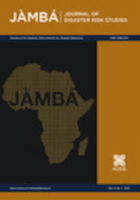
Jamba-Journal of Disaster Risk Studies
Navigating Risks, Shaping Safer Futures.Jamba-Journal of Disaster Risk Studies, published by AOSIS, serves as a vital resource in the fields of management, monitoring, policy, law, and safety research, with an ISSN of 1996-1421 and an E-ISSN of 2072-845X. Since its establishment as an Open Access journal in 2006, Jamba has dedicated itself to disseminating high-quality research that informs and enhances disaster risk management practices, particularly within the South African context and beyond. With a robust Impact Factor and acknowledgement in the Q2 and Q3 quartiles across critical categories in 2023, Jamba ranks favorably in Scopus, notably Rank #50/109 in Social Sciences (Safety Research) and Rank #218/399 in Environmental Science (Management, Monitoring, Policy and Law). The journal's convergence over the years—from 2013 to 2024—signals its commitment to adapting contemporary challenges in disaster risk studies. Scholars and practitioners are encouraged to explore Jamba as a go-to platform for innovative insights and collaborative discussions that impact policy-making and practical applications in disaster risk reduction.
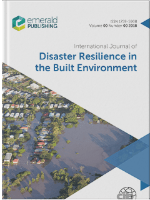
International Journal of Disaster Resilience in the Built Environment
Building a safer tomorrow, today.International Journal of Disaster Resilience in the Built Environment is a leading peer-reviewed journal published by Emerald Group Publishing Ltd, focusing on the crucial intersection of disaster resilience and the built environment. Established in 2010, this journal serves as an essential platform for researchers, professionals, and students engaged in the fields of Building and Construction, as well as Safety, Risk, Reliability and Quality, maintaining a respectable Q3 ranking in both categories as of 2023. With a commitment to enhancing global knowledge on resilient construction practices, the journal examines innovative strategies to mitigate risk and enhance safety in built structures. Despite its robust academic reputation, it currently operates without an open access model, emphasizing its curated approach to high-quality scholarship. The publication aims to foster interdisciplinary collaboration and advance the development of sustainable practices within the context of disaster risk reduction, making it a vital resource for anyone dedicated to improving resilience in the built environment.
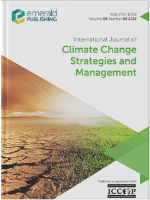
International Journal of Climate Change Strategies and Management
Pioneering management practices for a greener tomorrow.Introducing the International Journal of Climate Change Strategies and Management, a premier publication dedicated to advancing the understanding and development of innovative strategies addressing climate change. Published by Emerald Group Publishing Ltd in the United Kingdom, this journal has established itself as a trusted source within the realms of development, geography, and environmental science. With an impressive 2023 impact factor reflecting its high citation rates and a Q1 classification in pivotal categories such as Development and Geography, the journal stands at the forefront of climate change discourse. Since adopting an Open Access model in 2018, it has broadened its reach, making cutting-edge research accessible to a global audience. The journal encompasses a wide array of topics essential for academics and practitioners alike, focusing on management, policy-making, and methods for effective monitoring of environmental strategies. By fostering interdisciplinary dialogue, the International Journal of Climate Change Strategies and Management is essential for those aiming to contribute to sustainable solutions in our rapidly changing world.
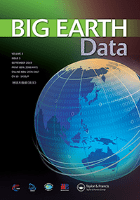
Big Earth Data
Empowering Research with Transformative Earth Data SolutionsBig Earth Data is a prestigious open-access journal that has been at the forefront of advancing research in the intersection of earth science and computer technology since its inception in 2017. Published by TAYLOR & FRANCIS LTD in the United Kingdom, this journal is dedicated to disseminating groundbreaking findings and innovative methodologies in the fields of Earth and Planetary Sciences and Computer Science Applications. With a commendable impact factor and an impressive positioning in the Scopus rankings—claiming Q1 status in Computers in Earth Sciences and Q2 in Computer Science Applications—it serves as a vital resource for researchers, professionals, and students alike. The journal encourages submissions that explore the integration of big data technologies in managing, analyzing, and visualizing earth-related data, thereby fostering interdisciplinary collaboration. Since embracing its open-access model, Big Earth Data has enhanced the accessibility of high-quality research, promoting a broader dialogue in the scientific community and contributing to informed decision-making in global environmental challenges.
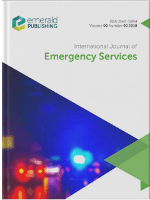
International Journal of Emergency Services
Catalyzing discourse on global safety and emergency practices.The International Journal of Emergency Services, published by Emerald Group Publishing Ltd, is a pivotal resource in the fields of management science, operations research, and safety research. With its ISSN 2047-0894 and E-ISSN 2047-0908, this journal serves as a platform for innovative research and discourse from 2012 through to 2024. Recognized for its quality, it holds a Q3 ranking in both management and safety categories, demonstrating its commitment to advancing knowledge and practice in emergency services. The journal is particularly valued for its contributions to enhancing operational efficiency, promoting safety, and addressing the evolving challenges faced by emergency service professionals globally. It attracts a diverse readership comprising researchers, practitioners, and students keen to explore cutting-edge findings and methodologies. With access options tailored for academic and professional communities, the International Journal of Emergency Services remains an essential reference for those seeking to improve emergency response frameworks and strategies within the UK and beyond.

NATURAL HAZARDS
Empowering communities through informed disaster management.NATURAL HAZARDS is a premier academic journal published by SPRINGER that focuses on the multidimensional aspects of natural hazards, their impacts, and mitigation strategies. With a robust impact factor and esteemed rankings in reputable databases such as Scopus, this journal is classified in the Q2 category in Atmospheric Science and Q1 in both Earth and Planetary Sciences (miscellaneous) and Water Science and Technology, showcasing its influence in these critical fields. Established in 1988 and continuing through 2024, it serves as a vital resource for researchers, professionals, and students alike, providing cutting-edge research and insights into the dynamics of natural hazards. Although it does not offer open-access options, the journal is accessible through institutional subscriptions, ensuring that high-quality research is disseminated efficiently to those dedicated to advancing our understanding of environmental challenges. By publishing empirical studies, theoretical analyses, and case studies, NATURAL HAZARDS plays a crucial role in informing disaster management policies and strategies, thereby contributing to a safer, more resilient world.
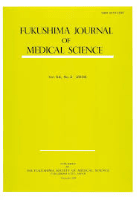
Fukushima Journal of Medical Science
Cultivating Excellence in Multidisciplinary ResearchFukushima Journal of Medical Science is a respected academic platform published by the Fukushima Society of Medical Science, focusing on a diverse array of topics within the field of medicine. With its roots tracing back to 1964, the journal has established a rich tradition of contributing to medical knowledge and remains a vital resource for researchers and professionals alike. Based in Japan, the journal holds a Q3 category ranking in Medicine (miscellaneous) as of 2023, showcasing its ongoing relevance and impact in the academic community. Although it currently does not offer open access options, its comprehensive content is accessible through institutional subscriptions. The journal's diverse rankings across multiple Scopus categories highlight its multidisciplinary approach, especially in areas such as Social Sciences and Phamaceutical Science, ensuring that it caters to a broad audience from various fields. The Fukushima Journal of Medical Science serves as an essential conduit for innovative research, collaboration, and professional development within its esteemed community, making it an invaluable asset for anyone invested in advancing the medical sciences.
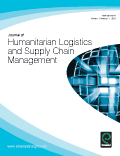
Journal of Humanitarian Logistics and Supply Chain Management
Navigating the complexities of humanitarian supply chains.Journal of Humanitarian Logistics and Supply Chain Management is a premier academic journal published by Emerald Group Publishing Ltd that addresses the critical intersection of logistics and supply chain management within humanitarian contexts. With an ISSN of 2042-6747 and an E-ISSN of 2042-6755, this journal has established itself as a leading resource for researchers, professionals, and students dedicated to enhancing operational efficiency and effectiveness in disaster relief and humanitarian aid. The journal enjoys a distinguished standing with a Q1 ranking in Management Information Systems and a Q2 ranking in Management Science and Operations Research, reflecting its contributions to the field and its significant impact factor, placing it in the 75th percentile among its peers in Scopus rankings. Covering a spectrum of topics from innovative supply chain strategies to responsive logistics frameworks, the Journal of Humanitarian Logistics and Supply Chain Management provides valuable insights and practical solutions that are essential for enhancing resilience and responsiveness in humanitarian operations as it converges through the years from 2011 to 2024. Researchers and industry practitioners alike are encouraged to engage with its robust articles, fostering collaboration and knowledge exchange to meet the evolving challenges faced in humanitarian logistics.
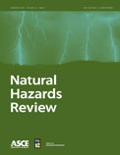
Natural Hazards Review
Exploring the Intersection of Nature and SocietyNatural Hazards Review, published by the ASCE-Amerc Soc Civil Engineers, is a prominent journal dedicated to advancing the understanding of the impacts of natural hazards on civil infrastructure, the environment, and societal dynamics. With a focus on interdisciplinary approaches, this journal plays a vital role in the fields of Civil and Structural Engineering, Environmental Science, and Social Sciences, evidenced by its Q2 rankings across multiple categories in 2023. Throughout its publication history since 2000, the journal has emerged as a key resource for researchers, practitioners, and students, providing innovative insights and fostering critical discussions regarding disaster risk reduction, resilience strategies, and sustainable practices. Although it does not currently offer open access options, authors and readers alike can benefit from its robust contributions as it continues to shape the discourse on mitigating the effects of natural hazards. By disseminating high-quality research, Natural Hazards Review is instrumental in promoting a comprehensive understanding of this pressing global issue.